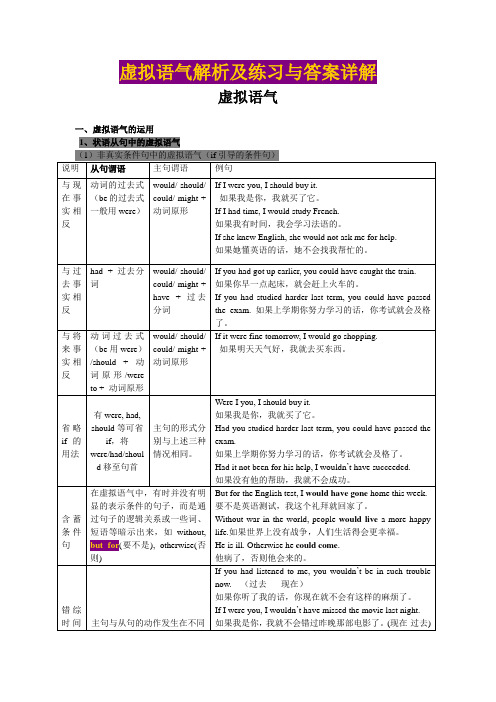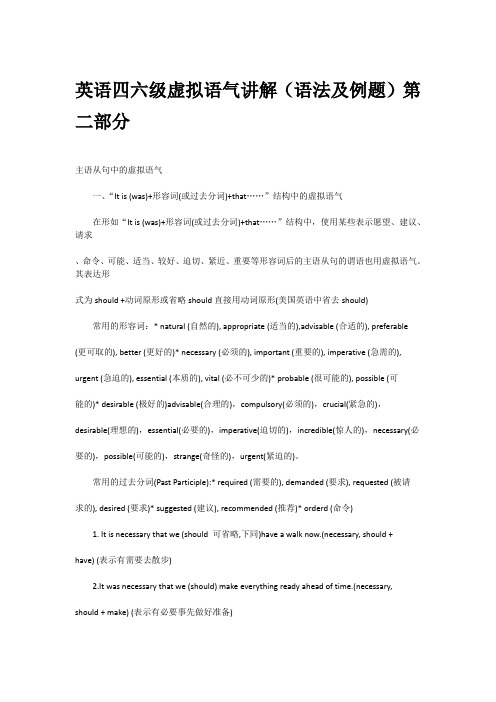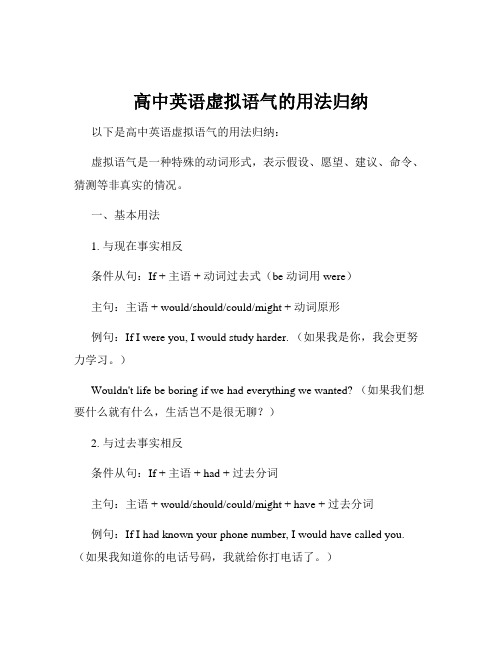虚拟语气用法详解 (2)
- 格式:doc
- 大小:70.00 KB
- 文档页数:7

虚拟语气解析及练习与答案详解虚拟语气一、虚拟语气的运用练习题及答案解释The millions of calculations involved, had they been done by hand,______all practical value by the time they were finished.A.could loseB. would have lostC. might loseD. ought to have lost解析:这个句子中含有一个省略if,把助动词提前到主语they之前的虚拟条件句,该条件句表示对过去情况的假设,而主句中by the time they were finished表明主句也应该是对过去发生的情况的假设,因而应该选(B)would have lost为正确答案。
2. Had Paul received six more votes in the last election, he our chairman now.A. must have beenB. would have beenC. wereD. would be解析:这道题目是一个混合虚拟语气的句子。
条件句省略了if,把助词had提前到主语前面,表示对过去情况的假设,而主句中now表明了对现在情况的假设,所以应选would(should, could, might)+动词原形这种表达形式。
四个选项中只有(D)是正确表达形式,故为正确答案。
3. If you Jerry Brown until recently, you’d think the photograph on the right was strange.A. shouldn’t contactB. didn’t contactC. weren’t to contactD. hadn’t contacted解析:until recently,因此(D)是正确答案,而主句是隐含的对现在情况的假设,该句是一个混合虚拟条件句。

英语四六级虚拟语气讲解(语法及例题)第二部分主语从句中的虚拟语气一、“It is (was)+形容词(或过去分词)+that……”结构中的虚拟语气在形如“It is (was)+形容词(或过去分词)+that……”结构中,使用某些表示愿望、建议、请求、命令、可能、适当、较好、迫切、紧近、重要等形容词后的主语从句的谓语也用虚拟语气。
其表达形式为should +动词原形或省略should直接用动词原形(美国英语中省去should) 常用的形容词:* natural (自然的), appropriate (适当的),advisable (合适的), preferable (更可取的), better (更好的)* necessary (必须的), important (重要的), imperative (急需的), urgent (急迫的), essential (本质的), vital (必不可少的)* probable (很可能的), possible (可能的)* desirable (极好的)advisable(合理的),compulsory(必须的),crucial(紧急的),desirable(理想的),essential(必要的),imperative(迫切的),incredible(惊人的),necessary(必要的),possible(可能的),strange(奇怪的),urgent(紧迫的)。
常用的过去分词(Past Participle):* required (需要的), demanded (要求), requested (被请求的), desired (要求)* suggested (建议), recommended (推荐)* orderd (命令)1. It is necessary that we (should 可省略,下同)have a walk now.(necessary, should + have) (表示有需要去散步)2.It was necessary that we (should) make everything ready ahead of time.(necessary, should + make) (表示有必要事先做好准备)3. It is required that nobody (should) smoke here.(required, should + smoke) (表示要求不要在此抽烟)4. It is important that every pupil (should) be able to understand therule of school.(important, should + be) (表示重要的是学生都能了解校规)5. It's important that we (should) take good care of the patient.(important, should +take) (表示重要的是照顾好病人)6. It is natural that she should do so. (形容词natural, should+动词原形do)7.It is essential that these application forms be sent back as early as possible.这些申请表应尽早地寄回,这是很重要的。


高中英语虚拟语气的用法归纳以下是高中英语虚拟语气的用法归纳:虚拟语气是一种特殊的动词形式,表示假设、愿望、建议、命令、猜测等非真实的情况。
一、基本用法1. 与现在事实相反条件从句:If + 主语 + 动词过去式(be 动词用 were)主句:主语 + would/should/could/might + 动词原形例句:If I were you, I would study harder. (如果我是你,我会更努力学习。
)Wouldn't life be boring if we had everything we wanted? (如果我们想要什么就有什么,生活岂不是很无聊?)2. 与过去事实相反条件从句:If + 主语 + had + 过去分词主句:主语 + would/should/could/might + have + 过去分词例句:If I had known your phone number, I would have called you. (如果我知道你的电话号码,我就给你打电话了。
)Couldn't you have done better if you had tried harder? (如果你再努力些,难道不能做得更好吗?)3. 与将来事实相反条件从句:① If + 主语 + 动词过去式② If + 主语 + were to + 动词原形③ If + 主语 + should + 动词原形主句:主语 + would/should/could/might + 动词原形例句:If it rained tomorrow, we would stay at home. (如果明天下雨,我们就待在家里。
)If she were to come here tomorrow, I would be very happy. (如果她明天来这儿,我会非常高兴。
)If he should fail in the exam, how disappointed his parents would be!(要是他考试不及格,他父母该多失望啊!)二、固定搭配1. wish 后的宾语从句与现在事实相反:从句用一般过去时与过去事实相反:从句用过去完成时与将来事实相反:从句用 would/could + 动词原形例句:I wish I were as tall as you. (我希望我和你一样高。

虚拟语气用法英语中的语气分为陈述语气、祈使语气、虚拟语气、疑问语气和感叹语气五类。
1、表示动作或状态是客观存在的、确定的或符合事实的,用于陈述句、疑问句和某些感叹句中。
China is an Asian country. (肯定句) How interesting my stay in China has been! (感叹句)2、祈使句表示说话人对对方的请求、警告,建议或命令。
如:Please come over here. 请到这边来。
Watch your steps! 当心!(走路)3、虚拟语气表示说话者做出的假设而非事实,或难以实现的情况,甚至表达彻底相反的概念。
此外,如需表达主观愿望或某种强烈的感情时,也可用虚拟语气。
虚拟语气是由句中的谓语动词的特殊形式表示出来的。
如: If I were a bird,I would be able to fly in the air. 如果我是一只小鸟,我就能在空中飞行。
I wish I could pass the examination. 我希望我能通过考试。
If there were a heavy snow next Sunday, we would not go skating. 如果下周日下大雪,我们就不能去滑冰了。
If she were to be here next Monday, I would tell her about the matter.如果她下周一来这儿的话,我就会告诉她这件事的始末。
4、有时,虚拟条件句中,结果主句和条件从句的谓语动作若不是同时发生时,虚拟语气的形式应作相应的调整。
这种条件句叫错综条件句。
①从句的动作与过去事实相反,而主句的动作与现在或现在正在发生的事实不符。
If I had worked hard at school, I would be an engineer, too.如果我在学校学习刻苦的话,我现在也会成为一个工程师了If they had informed us, we would not come here now. 如果他们通知过我们的话,我们现在就不会来这里了。

虚拟语气的用法总结虚拟语气是一种语法现象,常常用于表达非真实情况、假设情况、愿望意愿等。
在英语中,虚拟语气有两种形式:过去虚拟语气和现在虚拟语气。
下面是对虚拟语气的用法进行总结。
一、过去虚拟语气的用法:1. 表达不可能实现的愿望、欲望或建议:If only + 主语 + 过去完成时(had + 过去分词)例句:If only I had studied harder, I would have passed the exam.(要是我当初努力学习的话,我就能通过考试了。
)2. 表示对过去发生的事情的假设:If + 主语 + had + 过去分词, 主语 + would/could/might + 动词原形例句:If I had taken the bus, I would have arrived on time.(要是我坐公共汽车的话,我本能准时到达。
)3. 表示对与现在事实相反的情况的假设:If + 主语 + 过去式, 主语 + would/could/might + 动词原形例句:If I were you, I would apologize to her.(要是我是你的话,我会向她道歉。
)4. 表达对不可能实现的条件:If only + 过去式例句:If only I had a million dollars.(要是我有一百万美元该多好。
)二、现在虚拟语气的用法:1. 表达建议、命令等正式用法:表达建议:(should +动词原形/动词原形)例句:It's important (that) you should take some rest.(你应该休息一下,这很重要。
)表达命令:(应用“命令式”的虚拟形式)例句:It's vital (that) he be here on time.(他必须准时到达,这很重要。
)2. 表达愿望、要求、建议等陈述式的用法:It's time/It's high time + 过去式例句:It's time you went to bed.(你该去睡觉了,时间到了。
第一部分:语气的定义和种类1 语气(mood)语气是动词的一种形式,表示说话人对某一行为或事情的看法和态度。
2 语气的种类⑴、陈述语气:表示动作或状态是现实的、确定的或符合事实的,用于陈述句、疑问句和某些感叹句。
如:①There are two sides to every question.每个问题都有两个方面。
②Were you busy all day yesterday?昨天一整天你都很忙吗?③How good a teacher she is!她是多好的一位老师啊!⑵、祈使语气:表示说话人对对方的请求或命令。
如:①Never be late again!再也不要迟到了。
②Don’t forget to turn off the light.别忘了关灯。
⑶、虚拟语气:表示动作或状态不是客观存在的事实,而是说话人的主观愿望、假设或推测等。
如:①If I were a bird, I could fly in the air.如果我是一只小鸟,我就能在空中飞行。
②I wish I could pass the examination.我希望我能通过考试。
③May you succeed!祝您成功!虚拟语气在语法里算得上是个难点。
让我们就从最简单的开始吧。
第二部分:简单句中的虚拟语气一、情态动词的过去式用于现在时态时,表示说话人的谦虚、客气、有礼貌、或委婉的语气,常用于日常会话中。
如:⑴.Would you be kind enough to show me the way to the post office?请你告诉我去邮局的路好吗?⑵.It would be better for you not to stay up too late.你最好别熬夜到很晚。
二、表祝愿。
1、常用“may+动词原形”表示祝愿,但愿,此时may须置于句首(多用于正式文体中)。
⑴、May good luck be yours!祝你好运!⑵、May you be happy!祝你快乐!⑶、May you do even better!祝你取得更大成就!⑷、May you have a good time. 祝愿你玩的痛快。
if虚拟的用法(二)if虚拟条件句的省略当if虚拟条件句中有were/had/should,省略if,将were/had/should提前。
(一去二提)【例句】1.If Li Yifeng were my boyfriend, I would be the happiest girl in the world.→Were Li Yifeng my boyfriend, I would be the happiest girl in the world.2.If I had finished my task, I would have been in Beijing.→________________________________________________.3.If he should go to the zoo, we would have a happy hour together.→_________________________________________________.4.If he shouldn’t go to the zoo, we would be very sad.Should he not go to the zoo, we would be very sad.(否定词not不动,只将should提前)当遇到否定词not时,不能与were、had、should缩略,not 仍然放在主语后面。
If I hadn’t warned you,you could have been killed.→________________________________________.【总结】if虚拟语气从句中有_____、_____、______,省略_______,将______、_______、________提前。
【练一练】1._______ hard,he would have passed the exam.A.If he were to workB.Had he workedB.Should he work D.Were he to work2._______ you have a meeting tomorrow,I would have to put off to visit you.A.WereB.WouldC.ShouldD.will3.Had you come earlier,you ________ her.A.would have metB. would meetC.will meetD.should meet4.Should you have a meeting tomorrow, I _________ (have to) put off to visit you.5._________ (I be) in your position, I would not take his money.三、if虚拟条件句的错综【回顾】从句主句与现在事实相反的假设did would/should/could/might +do与将来事实相反的假设did/were to/should do would/should/could/might+do与过去事实相反的假设had done would/should/could/might +have done 【概念】If I had taken medicine last night, I would be better now.If you had listened to the doctor,you would be all right now.If I were you,I would have gone home 2 hours ago.错综的意思:if虚拟条件句中主句和从句时间不一致,动词的形式要根据它表示的时间加以调整。
⾼中英语虚拟语⽓⽤法详解虚拟语⽓语⽓(mood)也是动词的⼀种形式变化。
这和中⽂中的语⽓是不⼀样的。
它表⽰说话者对所指的动词或状态所持的态度,⽽且,在谓语动词上有所体现,⽽中⽂没有体现。
语⽓可分为三种:陈述语⽓、祈使语⽓和虚拟语⽓。
虚拟语⽓(the Subjunctive Mood)表⽰说的话不是事实,或者是不可能发⽣的情况,⽽是⼀种愿望、建议或与事实相反的假设等。
⼀、虚拟条件句1.主句和从句都与现在事实相反时,从句⽤⼀般过去时,be的形式要⽤were,主句⽤would/could/ should/might+不定式⼀般式。
If I were you, I should not go with him.2.主句和从句都与过去事实相反时,从句⽤过去完成时,主句⽤would/should/could/might+不定式完成式。
If I had tried hard last term, I would have succeeded.3.当主句和从句都与将来事实相反,或指不⼤可能发⽣的事的时候,从句和与现在事实相反的从句时态相同,或⽤should/were to+不定式⼀般式,主句和与现在事实相反的主句相同。
If it rained/were to rain/should rain tomorrow, the match would be put off.4.在使⽤虚拟条件句时,由于语⾔环境的千差万别,各种时间关系混合使⽤是很常见的。
如果逻辑上讲得通,主句和从句的动词时态可进⾏各种各样的搭配。
If it hadn't rained those days, (从句与过去事实相反)1 work would be finished next week. (主句与将来事实相反)2.here wouldn't be any water in the river now. (主句与现在事实相反)⼀、语⽓及其种类1.语⽓(mood)语⽓是⼀种动词形式,表⽰讲话⼈对某⼀⾏为或事情的看法和态度。
虚拟语气的用法和表示方式虚拟语气是一种特殊的语气形式,用来表达与事实相反或与现实条件相反的假设、愿望、建议等内容。
在不同的语境中,虚拟语气可以通过不同的句型和词语来表示。
本文将介绍虚拟语气的基本用法和常见的表示方式。
一、虚拟语气的用法1. 表示与现实条件相反的假设虚拟语气常用于表示与现实条件相反的假设情况。
例如,当我们要表达假设的情况下,可以使用虚拟语气来表示:如果我有钱,我会买一辆豪车。
(表示与现实相反的假设情况)2. 表示与过去事实相反的假设在过去时态的句子中,使用虚拟语气来表示与过去事实相反的假设。
例如:要是我从小就会游泳,我就不会害怕水了。
(与过去事实相反的假设)3. 表示建议、要求、命令或愿望虚拟语气可用于表示建议、要求、命令或愿望等情况。
例如:我建议你每天早上锻炼身体。
(表示建议)要求他立即离开房间!(表示命令)愿你新年快乐!(表示愿望)二、虚拟语气的表示方式1. 使用虚拟词或词组在表示虚拟语气时,常使用一些特定的虚拟词或词组。
例如:如果、要是、假如、希望、愿望、祝愿等。
如果我是你,我会抓住这个机会。
(使用“如果”引导虚拟语气)我希望他能够及时赶到。
(使用“希望”表示虚拟语气)2. 使用过去式或过去完成式在表示与现实条件相反的假设时,可以使用过去式或过去完成式来表示虚拟语气。
例如:如果他不忘记带护照,他就能出境了。
(使用过去式表示虚拟语气)要是你早点告诉我,我就不会错过这个机会了。
(使用过去完成式表示虚拟语气)3. 使用虚拟语气的情态动词情态动词可以用来表示虚拟语气的情况。
例如:如果我能飞,我就能飞到世界的另一端去。
(使用“能”表示虚拟语气)如果我愿意,我就参加明天的会议。
(使用“愿意”表示虚拟语气)综上所述,虚拟语气是一种用来表达与事实相反或与现实条件相反的假设、愿望、建议等内容的语气形式。
其使用方式包括使用虚拟词或词组、使用过去式或过去完成式以及使用虚拟语气的情态动词等。
掌握虚拟语气的用法和表示方式有助于提高语言表达的灵活性和准确性,同时也能使语言更加丰富。
虚拟语气用法详解一、条件句中的虚拟语气1. 条件句中虚拟语气的形式从句中提出一种与客观现实不相符或根本不可能存在的条件,主句会产生的一种不可能获得的结果。
条件句中的(1) 将来时的条件句中的虚拟语气。
如:If he should go to Qing Hua University, he would make full use of his time. 如果他要上清华大学的话,他就会充分利用他的时间了。
If he were to come here, he would tell us about it. 如果他要来的话,他会通知我们一声。
(2) 现在时的条件句中的虚拟语气。
如:If he were free, he would help us. 要是他有空的话,它会帮助我们的。
If he studied at this school, he would know you well. 如果他在这所学校学习的话,它会对你很熟悉。
(3)过去时的条件句中的虚拟语气。
如:If I had seen the film, I would have told you about it. 我如果看过这场电影,我会把电影内容告诉你了。
If I had got there earlier, I would have met Mr. Li. 如果我早点到那儿,我就会会到了李先生。
3. 运用条件句中的虚拟语气时,须注意的几个问题(1)当从句的主语为第三人称单数时,谓语动词若是系动词be时,可用was 代替were。
但在倒装虚拟结构及if I were you, as it were 中,只能用were。
如:Were I ten years younger, I would study abroad. 要是我还年轻十岁的话,我会去国外学习。
If I were you, I would try my best to grasp the chance. 要是我是你的话,我要尽力抓住这次机会。
(2) 有时,虚拟条件句中,主、从句的动作若不是同时发生时,须区别对待。
①从句的动作与过去事实相反,而主句的动作与现在或现在正在发生的事实不符。
如:If I had worked hard at school, I would be an engineer, too. 如果我在学校学习刻苦的话,我现在也会使工程师了If they had informed us, we would not come here now. 如果他们通知过我们的话,我们现在就不会来这里了。
②从句的动作与现在事实相反,而主句的动作与过去事实不符。
如:If he were free today, we would have sent him to Beijing. 如果他今天有空的话,我们会已经派他去北京了。
If he knew her, he would have greeted her. 要是他认识她的话,他肯定会去问候她了。
③从句的动作与过去发生的情况相反,而主句的动作与现在正在发生的情况相反。
如:If it had not been raining too much, the crops would be growing much better. 如果天不下太多的雨的话,庄家会长得更好。
If he had been working hard, he would be working in the office now. 要是他工作一直努力的话,他现在已进了办公室了。
(3)当虚拟条件句的谓语动词含有were, should, had 时,if 可省略,而将were, should, had等词置于句首。
如:Should he agree to go there, we would send him there. 要是他答应去的话,我们就派他去。
Were she here, she would agree with us. 如果她在这儿的话,她会同意我们的。
Had he learnt about computers, we would have hired him to work here. 如果她懂一些电脑知识的话,我们会已经聘用他来这里工作了。
(4)有时,句子没有直接给出假设情况的条件,而须通过上下文或其他方式来判断。
如:I would have come to see you, but I was too busy. 我本该来看你了,然而我太忙了。
But for his help, we would be working now. 要不是他的帮助,我们还会在工作呢。
Without your instruction, I would not have made such great progress. 要是没有你的指导,我不会取得如此大的进步。
(5)有时,虚拟条件句中,主、从句可以省略其中的一个,来表示说话人的一种强烈的感情。
①省略从句He would have finished it. 他本该完成了。
You could have passed this exam. 你应该会通过这次考试了。
②省略主句If I were at home now. 要是我现在在家里该多好啊。
If only I had got it. 要是我得到它了该多好啊。
二、其他状语从句的虚拟语气1.目的状语从句中的虚拟语气(1)在for fear that, in case, lest 引导的目的状语从句中,若用虚拟语气时,从句谓语为:should + 动词原形。
并且should 不能省略She examined the door again for fear that a thief should come in. 她又把门检查了一遍,以防盗贼的进入。
He started out earlier lest he should be late. 他很早就出发了以防迟到。
(2)在so that, in order that 所引导的目的状语从句中,从句中的谓语为:can / may / could / might / will / would / should + 动词原形。
如:He goes closer to the speaker so that he can hear him clearer. 他走近说话的人以便能挺得更清楚。
例如:They began to talk warmly as if they had known each other for long. 他们开始热烈的谈论起来就好像他们已相互认识很久了。
He coughed twice as if someone should come. 他咳嗽两声就好像有人要来了。
4. 原因状语从句中的虚拟语气amazed, angry, annoyed, astonished, disappointed, frightened, happy, pleased, proud, sorry, surprised, upset 等后面的状语从句中常用虚拟语气。
其虚拟语气的结构为:例如:I wish she were not married. 我真希望她没结婚。
I wish the bus went to the university. 我希望公共汽车能通到大学。
I wish I hadn’t wasted so m uch money. 但愿我没浪费这么多钱。
注意,从句的时态只与从句所指的时间有关,而与wish 的时态无关。
比较:I wish I were rich. 要是我现在有钱就好了。
I wish I had been rich. 要是那时我有钱就好了。
I wished I were rich. 当时我后悔自己没有钱。
I wished I had been rich. 当时我后悔自己曾经没有钱。
4.英语中,would rather, had rather, would sooner等之后的宾语从句常表示与客观事实不相符的一种愿望,故使用虚例如:I’d rather you had seen the film yesterday. 我倒想你昨天看过了这场电影。
I’d rather you were he re now. 我倒想你现在在这儿。
We’d rather you went here tomorrow. 我么倒想你明天去那儿。
四、主语从句中的虚拟语气在表达惊异、惋惜、遗憾、理应如此等意义的主语从句中常使用虚拟语气,其虚拟语其的结构为: should + 动词原形,主句中的谓语动词形式不限。
句型:(1) It is admirable / dreadful / extraordinary / odd / remarkable / sad / advisable / annoying / disappointing / surprising / upsetting / frightening / better / best / curious / desirable / important / strange / peculiar / proper / necessary / natural...that...(2) It is a pity / a shame / no wonder...that...(3) It is suggested / requested / desired / proposed /... that...(4) It worries me that...如:It is important that we should do well in our lessons first. 我们先把功课学好很重要。
It is strange that he should not come. 很奇怪,他竟没有来。
It is a pity that we should not meet last night. 真遗憾我们昨天晚上没有见过面。
It worries me that we should be blamed for that. 我们竟要受责备真让人烦恼。
五、表语从句及同位语从句中虚拟语气英语中,表示请求、要求、命令、建议等名词advice, desire, decision, idea, instruction, order, plan, proposal, recommendation, request, requirement, suggestion, wish充当句子的主语而后面接表语从句或它们后面接同位语时,表语从表面上看几屗及同位语从句都须用虚拟语气。